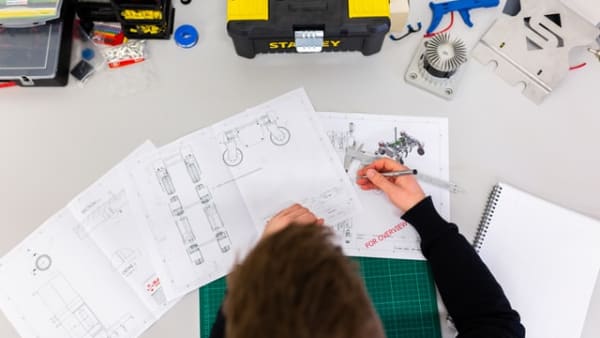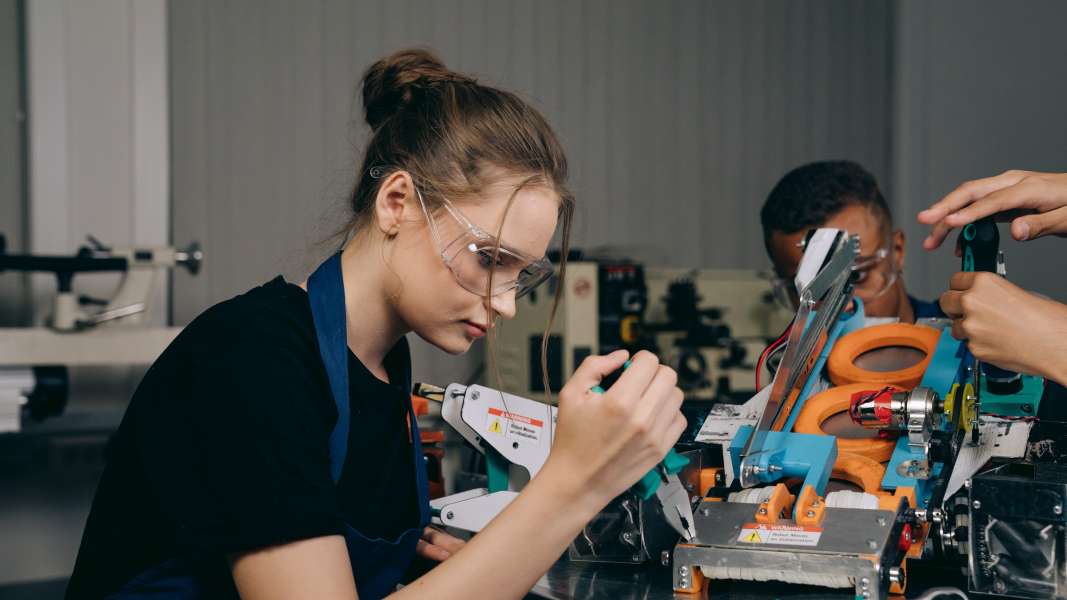
How To Hire A Mechanical Engineer
June 27, 2022

A mechanical engineer is a person in an organization that is responsible for mechanical systems, working in many different industries like manufacturing, automotive, aerospace, computer, biotechnology, automation and electronics.
The mechanical engineer needs to be able to design, develop, and inspect machines and components, look at problems and find solutions, and be completely responsible for developing mechanical systems from vehicles to power plants.
Recruiters who are looking to recruit a mechanical engineer need to know that not only are the candidates suitably qualified, but that they have the right skills and abilities to be successful.
This article will discuss the different duties that a mechanical engineer might perform in a normal work day, and the skills and abilities that the recruitment team should be looking for.
We will also look at the different tests that you could use to assess applicants during the recruitment process and why they are useful for hiring a mechanical engineer.
What should a mechanical engineer be able to do?
A mechanical engineer has several different daily tasks that they need to complete as part of the role, and recruiters should look for candidates who are qualified and able to do different things.
On a macro scale, the role of the mechanical engineer is to research, design, and evaluate mechanical products, equipment, systems or processes. They are also expected to operate and maintain them.
Mechanical engineers are tasked with researching and developing mechanical processes and products to test and analyze them for feasibility, cost, maintenance, operation and performance. These might be ideas from the business or directly from customers. They will also need to be able to use drafting tools and computer-assisted drawing equipment or software.
As part of the research and design, they need to think about energy conservation, reducing the carbon footprint and being generally more environmentally conscious, as well as estimating costs.
After the research, the mechanical engineer is responsible for coordinating and monitoring the production of components and systems, including selecting the right manufacturing methods and the best performance specifications.
They need to oversee the installation of the mechanics, as well as the operation and maintenance so that the machines or equipment work as they are meant to.
Mechanical engineers are able to apply mechanical knowledge and principles to new technologies in emerging fields like robotics, AI, and biomedical engineering.
In some cases, mechanical engineers also need to manage other employees and perform personnel functions for other engineers, production workers, and technicians.
Skills to look for in a mechanical engineer
With this diverse range of duties, a recruiter needs to be sure that the prospective mechanical engineer has the right skills to be successful in the future. These skills include certain technological and software competencies. Some of the skills to look for include:
CAD software: a mechanical engineer needs to be skilled in creating designs and drafting systems using computer-aided design tools and software, as well as understanding the technical drawings produced by CAD.
Critical thinking and complex problem solving: to be able to make the right decisions about how to deal with a mechanical problem or come up with a new system, a mechanical engineer needs critical thinking skills that are suitable for complex problem-solving.
Troubleshooting: a vital part of the role of a mechanical engineer is not only to solve problems, but also to find the problems in the first place. Troubleshooting skills allow a candidate to be able to follow logical procedures to troubleshoot issues.
Systems analysis and evaluation: continuous improvement saves money and time for a business, and one way for a mechanical engineer to help is by analyzing and evaluating the systems that are already in place before making suggestions for those improvements.
Mathematics: mechanical engineers should be comfortable working with numbers and using basic calculations and operations as part of their design, installation and maintenance roles.
Useful abilities for a mechanical engineer
There are certain inherent abilities that a successful mechanical engineer needs to have, so as a recruiter you want to ensure that the candidates that you are putting forward for roles have what it takes to be a success. You should look out for the following abilities in applicants, among others:
Oral comprehension and expression: a mechanical engineer will need to be able to communicate effectively with other employees, customers, and suppliers, working together to solve problems. They need to understand what other people are saying and speak so that other people can understand them.
Deductive and inductive reasoning: mechanical engineers need to have a logical mindset to be able to make reasoned decisions. They need to be able to follow general rules to get to a conclusion that makes sense, and use new and unfamiliar information to find the best answers.
Mathematical reasoning: for accuracy, the mechanical engineer has to be able to make use of their mathematical knowledge and ability, applying it to find the right answer.
Visualization: whether they are designing a new system or troubleshooting a problem, the mechanical engineer needs to be able to visualize the components and processes.
Perceptual speed: mechanical engineers need to be able to work quickly and make decisions as they go, so the ability to change their way of working quickly as a situation develops.
Which soft skills tests could I use to hire a mechanical engineer?
Soft skills are essential to the success of any applicant, but they are difficult to assess in a traditional application process (reading a CV or application form, for example). Soft skills tests make it easier for a recruiter to understand exactly what level of ability a candidate has in the specific soft skills that are essential for success:
Adaptability: mechanical engineers deal with fast-moving and fluid situations in maintenance and repair, and keep up with the different demands of their organization. Therefore, they need adaptability skills, which can be tested using this assessment.
Accountability: mechanical engineers need to be held accountable for their decisions and take responsibility when it is necessary. The accountability assessment looks at the ability of each candidate to be able to take responsibility for their decisions.
Problem-solving: there are different methods of problem-solving that could work for a mechanical engineer, and this test assesses how a candidate chooses to make their decisions to solve problems.
Teamwork: even though this is often a management role, the mechanical engineer needs to be able to work successfully as part of a team to reach goals and solve problems. In this assessment, a candidate has to demonstrate their teamwork skills.
Project management: mechanical engineers are often involved in project-based situations, taking on the role within a business to instigate change or solve a problem. This assessment allows a candidate to demonstrate how they work on a project.
Which technical or aptitude tests could I use to hire a mechanical engineer?
Although some technical skills can be demonstrated with education and qualifications, proficiency is not as easy to judge.
For a mechanical engineer, technical ability in using CAD and other design software might be demonstrated through experience and qualifications, while other aptitudes need specific testing, such as:
Mechanical reasoning: mechanical reasoning skills are an obvious thing to test for, specifically for the ability to be able to apply the knowledge of mechanical principles to solve problems in a reasoned manner.
Numerical reasoning: in the numerical reasoning assessment, the candidate needs to demonstrate their ability to understand graphs and tables and complete simple operations to solve problems.
Spatial reasoning: being able to visualize the way a system might work comes from being able to see things in relation to the space they are in, so in the spatial reasoning assessment, the candidate is tested using 2D and 3D shapes.
Logical reasoning: making logical deductions by taking new and unfamiliar information to make rules apply and find the right solutions is part of the problem-solving process, allowing candidates to demonstrate that they have critical thinking skills.
Error checking: a good mechanical engineer needs to have an excellent eye for detail, and the error checking assessment is designed to show how skilled a candidate is at spotting problems and errors.
Our recommended test battery for a mechanical engineer
Although these assessments are great for testing candidates for their suitability as mechanical engineers, using all of them would be unwieldy for the recruiter and take a long time to complete for the applicants.
The Neuroworx team have chosen the following test battery to make the process more streamlined:
Mechanical reasoning: the mechanical reasoning assessment has questions that are based on diagrams and images of common mechanical things. The candidate needs to apply their knowledge of common mechanical and physics principles to the images in order to find the correct answer out of the multiple-choice options presented.
Project management: the project management assessment asks questions that are based on a series of realistic work-related scenarios. The scenario that is presented has several possible courses of action that the candidate could choose to solve the presented issue, and they need to use their project management skills to choose the right one.
Spatial reasoning: in the spatial reasoning assessment, the candidate is presented with questions that require them to visualize the movement of objects and shapes in space. The questions use both 2D and 3D shapes, and the candidate needs to be able to think about the net of the shape, how it looks when mirrored, and the way it moves.
For a more in-depth look into the qualities that a prospective mechanical engineer needs in a single test, check out the Neuroworx mechanical engineer job knowledge test - designed to help recruiters find the most qualified candidates for the role.
Boost your hiring power.
Start using Neuroworx today.
Talk is cheap. We offer a 14-day free trial so you can see our platform for yourselves.
Try for free




